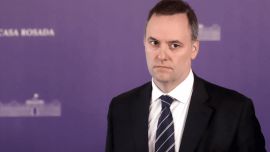Anne-Marie Slaughter is the CEO of the New America think-tank and a professor of international relations at Princeton University. She has held senior decision-making positions in Washington and knows US president-elect Joe Biden's closest advisors. In fact, she was the first woman to become the US State Department's Director of Policy Planning in 2009, serving under Hillary Clinton in former president Barack Obama’s administration.
In an exclusive interview, Slaughter discussed the United States’ relationship with China, Russia and Latin America.
What will Joe Biden's foreign policy priorities be?
I would have to answer that question in terms of style and substance. In style, if Donald Trump was ‘America First,’ Biden will be ‘Allies First.’ He will approach every issue, whether geopolitical or global, in terms of who our friends and partners are and how we rally them to meet these challenges together. It's a much more solidarity approach to global affairs.
Much of the first year will be spent repairing damaged relations with allies and figuring out which are the right groupings to approach China, Iran, to focus on Russian misinformation – that's the change in style. It's also recognising that the United States is in a different place in the world. We will not be going back to some mythical hegemonic leadership – the world has moved on, and we have to find a new way to lead.
In terms of substance, climate is clearly his top priority. The first thing he will do is sign the Paris Agreement. It's very important to see that climate epitomises an issue that is both domestic and global. He will focus on green technology, on the clean economy, on a lot of domestic investment and on how the world seriously addresses how to save us.
He will also focus on nuclear proliferation. He will sign the START Treaty [Strategic Arms Reduction Treaty] with Russia right away. That will lay the foundation for thinking about how to have a new Iran deal because for Biden it's more about how to prevent nuclear proliferation than it is about Iran itself. He will try to avoid a Middle East where Iran, Saudi Arabia, Israel already, and Egypt all have nuclear weapons.
The third thing is how do we ensure that the digital world we inhabit reflects democratic values? That's partly against China, against Russia, but it's also a big and complicated set of issues, where you want the Europeans, the Asians, the Latin Americans on board. The point is: Can we govern the Internet, artificial intelligence, and the digital world in a way that protects and respects privacy, security, and openness?
You wrote in an article for the Financial Times that "the pillars of Biden's foreign policy can be captured by three ‘Ds’: domestic, deterrence and democracy.” How can those pillars strengthen the United States in its competition with China?
The domestic part is absolutely vital. As I said about climate, Biden's people believe that we cannot compete with China or just play the role we need to play in the world unless we rebuild and renew at home. That part is essential – it's connected to China, but we should do it even if China didn't exist.
The deterrent has a lot to do with China, but also with Russia and any other adversary. It is simply to modernise our defence, so that we can rely much more on deterrence than actually using force.
The part of democracy is the most complicated. Biden has said he will convene a Summit of Democracies; his advisor Tony Blinken, who will be Secretary of State, has talked about a League of Democracies. I do think that Biden sees the value in what he might call “rallying the free world” against the authoritarians, and China is the most powerful of the authoritarian states.
We'll have to see how this plays out. I think it's complicated. I called for a concert of democracies in 2006 at the Princeton Project in National Security, but right now I would focus less on democracies versus dictatorships, than I would on open societies, open governments and open international order. The United States itself doesn't look like a great democracy at the moment – we had an election where the president refused to concede. So it's a very tricky thing to say "these are the democracies and those are the dictatorships." This is not about China. It's about strengthening democratic values, the liberal values of open societies, transparency, participation, accountability. I would prefer to see that.
Biden's idea of a Summit of Democracies sounds very similar to the thesis of his Princeton colleague, John Ikenberry, in his latest book, A World Safe for Democracy: Liberal Internationalism and the Crises of Global Order. Do you think Biden's foreign policy will be liberal?
I do think it will be liberal in John Ikenberry’s sense. John and I were co-chairs of the Princeton Project in National Security. We both argued for a concert of democracies. We would still agree on what we call a liberal international order, a rules-based order. But recently the United States has been willing to impose rules on others and not abide by them itself. I wouldn't say recently, [but since] a long time ago. We never signed the Law of the Sea Treaty, there are several treaties that we have not accepted.
I think it was in the 1990s when John Ruggie wrote that American exceptionalism was really American exemptionalism to international rules. I think John and I would agree that having a liberal international order – by which I mean a rules-based order, open, transparent, governed by laws, by respect for human rights and by democratic values – is a good thing. But that order needs a radical updating. And that's a problem because no one can figure out how to reform the United Nations. It is impossible to imagine a world in 2045 that will be run by the victors of World War II – it's like saying that in 1945 we should be led by the European powers of 1845. So it is a central question how we are going to reform that order.
Will Biden's team and its policies be multilateral? Will they champion the idea of a rules-based international order? Will they actually be bold enough to make the changes that will make many countries feel they have a real stake in that order? I don't know. We should go beyond the labels of democracies versus non-democracies and the Security Council versus everybody else. That doesn't work.
I would probably look at strengthening regional institutions. Build regional sovereignty pools, as the Europeans did, in a way that allows a lot of regional autonomy but still some form of global structure.
What will be the red lines that Biden will draw for China?
In the South and East China Sea we will continue to make it very clear that we support freedom of navigation and, ironically, the provisions of the Law of the Sea Treaty, which we recognise as customary international law. That will not be new. The Trump administration has already done so and I believe we will follow suit. We will make it very clear that China cannot turn Asia into a Chinese Protectorate.
We will continue to work with the Quad: Japan, South Korea, Australia, and India. They are our key allies and we are also a Pacific power. I believe that cyber conflict, cyber aggression, is another red line, where we will hit back. That's a deterrent. Perhaps we will also draw red lines in space. I think both in the commercial exploitation of space, and also about contemporary warfare.
The harder questions are two: trade, where I think Biden will keep the sanctions for now and probably try to get an agreement that won't look that different from Trump's; and human rights. Biden is talking about democracy, he is talking about a liberal order, and that means that we should defend human rights of the weakest, human rights in Hong Kong. China is a nuclear power... I think we will be more public, but will we draw red lines? I don't know.
We will probably work with our allies and with the ASEAN nations to push back against Chinese bullying.
In 2009, Obama tried to reset the relationship with Russia and that didn't work out. What should Biden do now with Moscow?
It's very interesting that Putin in August said publicly that he did not agree with Trump’s criticism of Hunter Biden’s business in Ukraine. And that's very interesting because it indicates that Putin thought in August: ‘I don't know if I want to anger the next president of the United States.’ So there's an opportunity there.
Biden will be very tough on disinformation and on Russia meddling in our affairs and we will threaten to expose Russian secrets. But I think Biden also recognises – and I should have mentioned this with regard to China as well – that we need Chinese cooperation on climate, and Russian cooperation on Iran and on a lot of global issues.
Frankly, Russia right now is playing a more important diplomatic role in the Middle East than the United States. I hope that Biden will be pretty pragmatic and say to Russia, ‘Well, we will push back very hard when you interfere with our interests in Ukraine, when you make trouble, but we actually would also like to work together if you are willing to abide by basic rules. If you keep poisoning people in other countries, no. We will take you seriously on the world stage.’ Russia is a great power and should be treated that way.
What will US foreign policy be like with respect to Latin America?
I think he will try to go back to where Obama was on Cuba. He will try to re-open relations. He will push hard on Venezuela, but that will be continuing a policy.
What I don't know is whether he will really try to think about the Americas in a more comprehensive way. Obama thought about that. Secretary Clinton thought very strongly that was important, both because of the power of Latin American countries but also because of what the United States is becoming. Latinos will be the largest minority, beyond White Americans. If you think about the fact that European-American ties are given because a majority of Americans came from Europe, now a substantial plurality of Americans will come from Latin America and that should make a difference.
The problem is that so often, no matter what the president wants to do, crises come from other places and the agenda never gets carried out. I hope he will have a creative and innovative policy that says that the Americas matter and that we must strengthen our regional organisations. We need to think about Latin America as a region that is as important as others in the world, but often that doesn't happen.
In which areas could Argentina cooperate and engage with the Biden administration?
It would be great to see Argentina engaging on a number of fronts. One would be really thinking through what is a sustainable global investment regime. Argentina has defaulted on its debts and is a country that in some ways is a poster child of what does not work about the way wealthiest countries invest in emerging economies. I think we do need a lot of reform in the global investment space.
Biden will also want to focus on tax evasion and anti-corruption policies. It would be great if Argentina could play a role in Latin America as really taking bold positions. The other thing that would be interesting is if Argentina can join with other Latin American countries to push a transatlantic agenda that is not just North Atlantic, but also involves the region and Africa.
Will Biden ask for Argentina's support in addressing the humanitarian crisis in Venezuela?
I hope so. The Biden administration would like to see a regional response to regional crises. You won’t see him saying that it is up to us to address the crisis in Venezuela – he will be talking to Chile, to Argentina, with important countries that will not always be Brazil and Mexico. That would be a reasonable approach.
You wrote a very interesting article for The Atlantic entitled “Why women still can’t have it all.” What should governments do to bring about gender equality?
I try not to talk about having it all in a world where so many people don't have enough. But I would say that governments should focus on allowing all their citizens and residents, all human beings, to be who they want to be and that means enabling women to pursue their careers in jobs that men traditionally had. But it also means, and this is very important in Latin America, undoing the stereotype of traditional masculinity so that men can decide if they want to spend more time with their families, or be teachers, or nurses, or whatever role was traditionally for women. Let society validate that for men, as well as for women.
I don't think governments can ever achieve gender equality only by focusing only on women. If we change the roles of women, then we have to change the roles of men as well. Only then will we achieve gender equality.
What should a feminist foreign policy look like?
A feminist foreign policy would take very seriously the idea that gender equality is a sign of the health of that country's economy and political system, a sign that it is actually living up to its values, and that it is tapping all of its talent.
There are many good reasons for partnering with Saudi Arabia, but the way it treats its women is not something you can ignore. Indeed, if you compare Saudi Arabia and Iran, women are better off in Iran than in Saudi Arabia. We should seriously consider how a government treats women as a way of assessing the strength of that country and also what kind of relationship you want with that country.
A feminist foreign policy will also recognise that lots of development issues are as important as geopolitical issues: global health, global education, access to resources, employment have much greater impact on women than on men.


























Comments